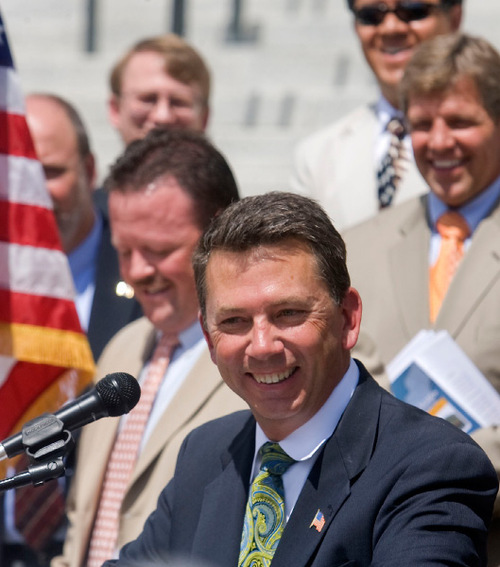This is an archived article that was published on sltrib.com in 2010, and information in the article may be outdated. It is provided only for personal research purposes and may not be reprinted.
A poll released Tuesday suggests outrage over Arizona-style immigration bills — including one authored by Rep. Stephen Sandstrom, R-Orem — is sowing discontent among Latinos toward the Republican Party.
The Pew Hispanic Center, a nonpartisan research group based in Washington, D.C., found just 6 percent of all registered Latino voters believe the Republican Party showed concern for them. Among Latino Republicans, just 18 percent said their party showed concern for them.
These findings could be viewed as alarming to the GOP — even in a state as heavily Republican as Utah, according to Kirk Jowers, director of the Hinckley Institute of Politics at the University of Utah.
"In the short term, Republicans may see an advantage in pursuing some of these policies that alienate Hispanics. In the longer term, it is very clear that demographic trends don't support a party that can't get at least 40 percent of the Hispanic vote [nationally]," Jowers said. "Locally, the same analysis holds, but the time period is not nearly as immediate."
The Sandstrom bill has been the flash point for dialogue on illegal immigration in recent months and it has been met with support from more conservative Republicans because of its law enforcement focus.
The bill hews to the Arizona law that sought to give local police broad powers to enforce federal immigration laws by allowing them to question those suspected of being in the state illegally.
But Sandstrom's bill only allows for local law enforcement to question a person's status if they were pulled over for another violation. Unlike the Arizona law, officers couldn't question the citizenship of those who might be in the company of a person suspected of a crime or a traffic violation.
In Sandstrom's mind, the Arizona law went too far.
"I think it was well thought out, but not thought through all the way. A police officer doesn't have the right to walk up to them and accuse them of that crime," Sandstrom said. "It opens the door to racial profiling."
Michael Clara, chairman of the Utah Republican Hispanic Assembly, said Sandstrom's bill is already losing some support among GOP lawmakers he's spoken with.
"The talk — it's a whole different tone," Clara said. "They really started talking about its impact. The two things that came up were the economic impact this will have for the state of Utah and the cost of doing what Representative Sandstrom wants to propose."
Sandstrom won't back down on his bill, however, even as he met with Utah Attorney General Mark Shurtleff on Tuesday afternoon to discuss the proposed legislation.
Sandstrom said the two simply would "never see eye to eye" on some aspects of the bill.
The attorney general said he fundamentally disagreed with the measure as a policy that turns local police into immigration officers.
Shurtleff also said there is a grave, long-term danger for the GOP. If Sandstrom's bill is enacted into law, he said, "We will never recover as a party."
Latinos, according to the latest census data, make up 11.5 percent of Utah's population. And the nonprofit Immigration Policy Center indicated in 2008 that 32 percent of immigrants in Utah are naturalized citizens and are eligible to vote. And those numbers are growing.
Tony Yapias, director of Proyecto Latino de Utah, said Republicans have allowed the voices from the far right to dominate the debate and shape the perception of the party as anti-Latino — and that will have an impact on younger Latinos who will become voters down the road.
"Republicans should see this study as a red flag," he said. "They're basically kicking Latinos out of their party for good."
The study indicated Latinos overwhelmingly favoring Democrats — especially as Election Day draws closer.
Among registered Latino voters, 65 percent said they planned to support the Democratic candidate in local congressional races, compared with 22 percent for the Republican candidate.
However, the study also indicated a bright spot for Republicans: Latinos appear less motivated to vote than the electorate as a whole. According to the study, only 51 percent of Latino registered voters said they were certain to vote in November, compared with 70 percent of all registered voters.
Yapias said the study reflects Latinos' limbo as President Barack Obama and the Democratic Congress haven't passed meaningful immigration legislation, while Republicans dial up rhetoric.
"It shows how disillusioned Latinos are," Yapias said. "They are disillusioned and have nowhere to go."
However, the Pew study also indicates immigration as only the fifth-most-important issue to Latino voters, far below education and jobs.
Lee Davidson contributed to this report



